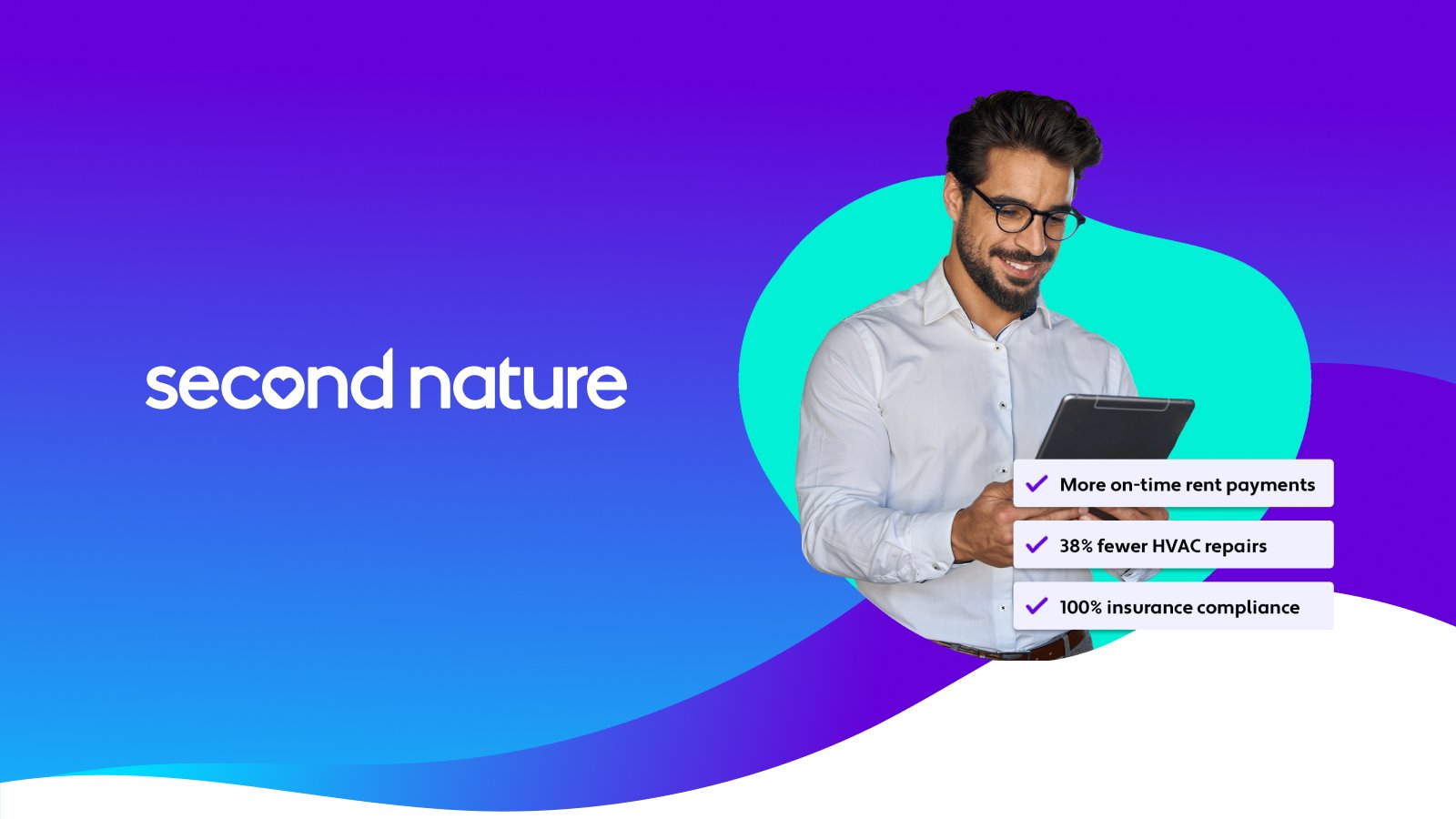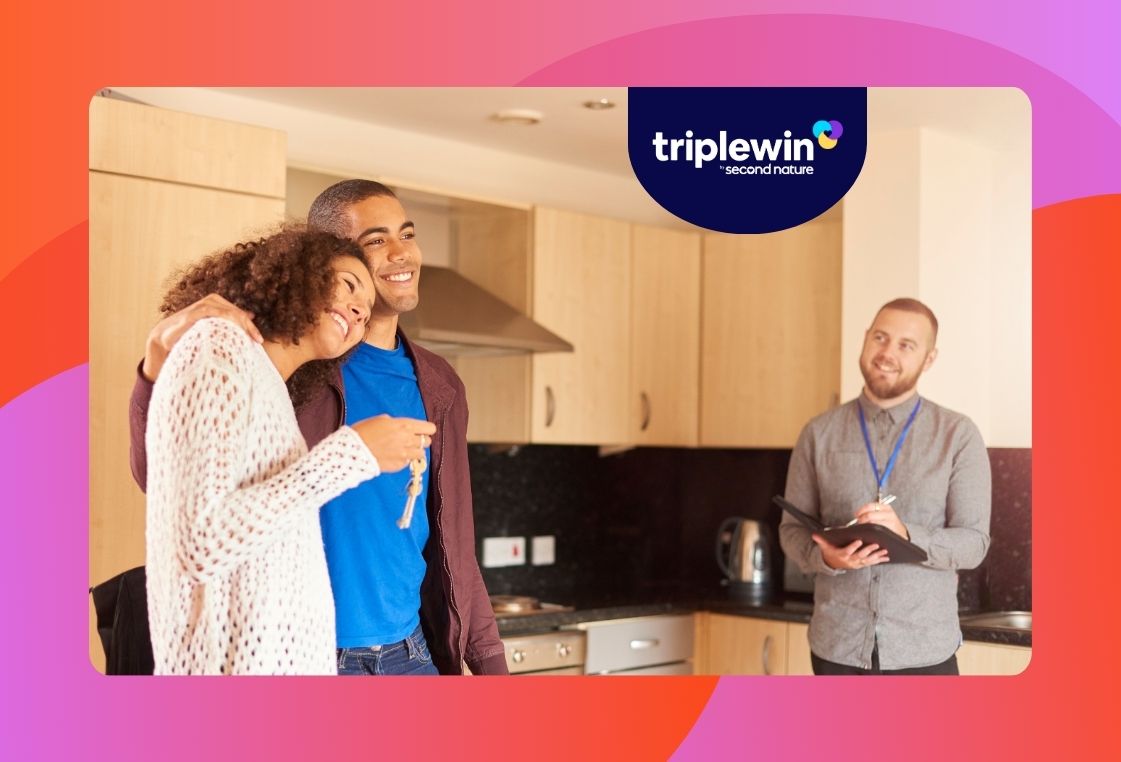What we'll cover
Why should property managers pay attention to the resident experience?
How can improving the resident experience save property managers money?
Tools to help improve resident retention
Examples of resident experience initiatives
How do you monitor or measure the resident experience?
How do you use the information you receive in resident feedback or surveys?
What questions should you ask if you are considering a resident experience survey
Easily Manage and Improving Resident Experience With Second Nature RBP
Resident expectations are changing. In today’s “experience economy,” residents and consumers alike are looking for experiences that make them feel taken care of, bring more ease into their lives, and set businesses apart.
With these changes in mind, property management companies are developing innovative strategies to build better resident experiences – experiences residents will pay and stay for.
Today we’re sharing a Q&A about the resident experience with Melissa Gillispie, the Director of Leasing & Property Management at JWB Real Estate Capital. Here’s what you’ll find in the article.
Key Learning Objectives:
- Core tenants of resident experience
- Steps to improve resident experience
- How improving resident experience can save money for property managers
- Resident experience examples that have worked
- Resident experience examples that haven’t worked
- How to monitor resident experience
Meet the Expert:
Melissa Gillispie, Director of Leasing & Property Management at JWB Real Estate Capital
Melissa started her career with JWB in 2013 and is currently the Director of Property Management. She is the licensed real estate broker for JWB and plays an integral role that has led JWB to manage over 4,900 single-family homes in Jacksonville FL, being the largest local rental management company in Northeast FL. Under her purview, JWB has delivered over 26 million dollars in cash flow to its current clients through exceptional management services. Melissa also sits on the Board for NARPM Northeast FL as the Membership Co-Chair. She won the 2022 NARPM Rocky Maxwell award for dedicated service and contribution to NARPM. She is married to her husband of 14 years and has three sons aged 11, 9, and 6. When she is not working, she can be found at the football and soccer fields cheering her sons on!

Why should property managers pay attention to the resident experience? What steps can property managers take to improve the resident experience?
Happy residents stay longer, take better care of the home, and provide better long-term stability and return on investment for clients. They also spread the good word locally and refer more renters to you. And happy residents are usually nicer, leading to happier staff!
Residents (and customers in general) are increasingly driven by instant gratification. They expect immediate communication, results, and benefit. Due to this, we have to increase our speed to outcome for them and set great expectations so that we can "under promise and over deliver" – one of our JWB core values!
Some key steps to improving resident experience include:
- A great lease signing experience with impeccable expectation setting. If everyone knows from day one, who is responsible for what, we can avoid tough conversations down the road.
- Timely communication. Knowing the type of communication each resident prefers. We have a field in our system called "preferred contact method" – if it is via phone, pick up the phone. If it is text, text away. It helps the resident feel like you're willing to customize their experience.
- Answer the phone! Like any place open for business, you need to be reachable during office hours.
- Solve their maintenance issues. Make it easy for them to report those issues to you.
If I had to give just one: Clear communication is EVERYTHING. Clear expectations, timely responses, and thoughtful and respectful interactions make us a professional industry vs. a mom-and-pop one.
How can improving the resident experience save property managers money? Do you recommend hiring a dedicated resident experience specialist, resident manager, or separate team?
Improved experience saves TIME. Time is money. Fewer tough conversations, supervisor calls, upset people impacting employee satisfaction, etc. Great experience leads to retention, which saves money and increases revenue for the business.
I think the idea of a dedicated specialist or team is great in theory, but many places want to scale back on staffing (employees are expensive!). I also think that putting the responsibility on one person/group of people in the organization is a mistake to some degree. This limits creativity and reach.
At JWB, our approach is that it is every teammate’s responsibility to dedicate effort and time to a great client/resident experience. This allows a wide range of ideas to generate and gives the feeling of impact and satisfaction to every teammate for their contribution.
Do you recommend using software or tools to help improve resident retention?
Here are some of the best tools we’ve used.
- Automation: Implementing things that don't require a ton of person-hours will allow you to scale your business at a lower cost. The automation/technology investment is worth it in the long run.
- The Resident Benefits Package (RBP) by Second Nature: DO IT!
- Find a mail fulfillment house in your city and rely on them to send mass communications via snail mail.
- Partner with local businesses for discount codes.
- Text Magic and Call Fire are great automation tools for communication via phone and text.
What are examples of resident experience initiatives that have proved effective? On the flip side, what doesn’t work?
Residents need to see the value in any initiative. Knowing your audience/clientele and what matters most to them is important. Is it time savings? Money saving?
RBP from Second Nature has been a game-changer. It meets a real need and serves a purpose. We also do a monthly resident newsletter. We send out automatic happy birthday emails to every resident on their birthday (we have been able to automate this completely, so 0 time for staff and 100% feel-good for residents).
We do "get to know your city" marketing for new residents with mural maps, restaurants and grocery stores near them, etc. We include a magnet at move-in on their fridge with our contact information and after-hours information. These all create moments that show care and concern, and we sprinkle in love for our city.
When you miss the mark on providing value or miss the need the resident actually has, that experience moment may fall flat. So we constantly focus on who our residents are and what will fill their cups.
How do you monitor or measure the resident experience?
We love surveys! We have maintenance and resident net promoter score (NPS) surveys. Every time a work order closes, the resident receives a survey to give feedback on the experience. We review that weekly. For positive surveys, we ask for reviews. Supervisors reach out for low scores to see how we can improve.
For the NPS surveys: If they leave a high score, we ask for a positive review on one of our online platforms (Google, Facebook, BBB). If they leave a low score, supervisors seek feedback to improve.
The key is DOING SOMETHING with the information you receive; otherwise, there is no value. Don't just let a low score come through and then do nothing. Reaching out shows the resident you pay attention, value the feedback, and want to improve.
Reviews online are also a good way to gauge experience. Take those with a grain of salt, however. People are much more likely to leave a bad review than a good one, so it is a lot of work to win here!
We ask for positive reviews anytime we have a great interaction with a resident – a phone call where we solve a problem, an email where they say thank you, or anytime someone pays on time or renews their lease – we ask. You don't get positive reviews you don't ask for!
How do you use the information you receive in resident feedback or surveys?
There is value to it. You can gather a lot of good information and start to identify trends in the data.
We can pinpoint areas as a team to improve and celebrate the things we do well. I do think you have to take some of the responses with a grain of salt. You can't make everyone happy even when you try. View it as information to help make decisions vs. the end-all-be-all to measure your worth as a company.
We survey on maintenance every time a work order closes, and we get about a 3-5% completion rate. For the NPS surveys, we survey 60 days after move-in and then every six months. We get a 10% completion rate on those.

What questions should you ask if you are considering a resident experience survey? What’s a good sample size for a survey? Are there other tips and tricks to keep in mind?
For our NPS survey, it is one question: “How likely are you to refer your friends and family to rent from us?” They score us 1-10, and then we allow an open text response field that is optional if they have more to say.
For the maintenance surveys, we ask: “On a scale of 1-5, how satisfied were you with 1. the work order submission process; 2. Your maintenance coordinator, 3. The vendor who performed the work, 4. The amount of time it took to complete the work; 5. The overall experience?” Each star scale also allows for open-text responses (again, not required).
I think a good sample size is when at least ¼ of your customers have had the opportunity to review. Until that point, the results seem to be all over the place. We track results monthly, quarterly, and annually, as well as by the property manager and maintenance coordinator, work order category, and property type (multi-family, single-family, condo, townhome, etc.).
All of this helps us put together a comprehensive picture of where we stack up against ourselves over time. I think it is important to benchmark against yourself. Each business runs in a unique way, so I get less caught up in how other people are doing compared to me and more caught up in how I am doing compared to myself/my business three, six, or 12 months prior.
Perspective is important when you are being vulnerable and asking for feedback!
Easily Manage and Improving Resident Experience With Second Nature RBP
As Melissa mentioned, the Resident Benefits Package (RBP) by Second Nature goes a long way to creating premier resident experiences. And as the country’s only fully managed RBP, it doesn’t take up your team’s time or bandwidth.
We designed the RBP to solve headaches for property managers and help them deliver world-class resident experiences that delight residents and build long-term retention. Happy residents = happy clients = happy PMC teams. A triple win! At Second Nature, we’re all about building experiences that residents will pay for and stay for.
Topics:




